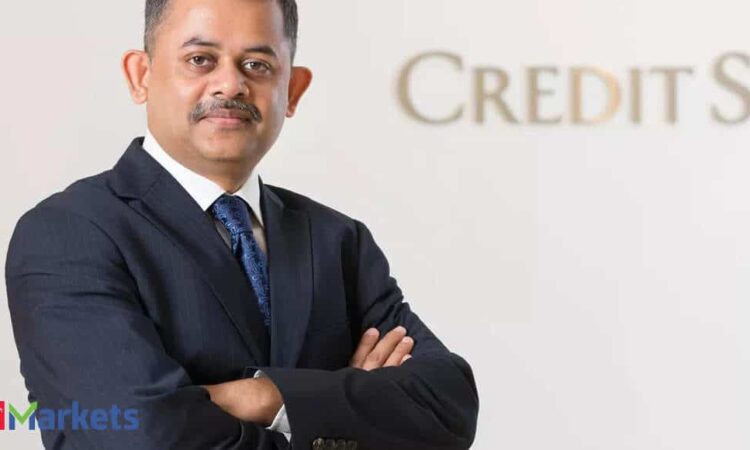These 3 themes will decide stock market trajectory in 2023: Neelkanth Mishra, Credit Suisse

The trajectory of the US Fed funds rate, reopening of China and the changing energy mix are the three themes that will dominate investor minds in 2022, says Neelkanth Mishra, India Equity Strategist, Credit Suisse in an interview with ETMarkets.com. Edited excerpts
In your India Strategy report, you have gone overweight on financials. So when this credit cycle slows down, do you think the PSU banks would be the first ones to get thrown out?
Not really. I do not expect the credit cycle to slow down. There is a potential risk if there is a sharp disorderly global slowdown. If there is an orderly slowdown, I do not think India will get badly affected but if there is a disorderly slowdown like a financial market accident, then that can create issues in the economy. If that happens, then poor quality banks will be the worst affected. That is a real risk but more of an event issue.
I do not expect the overall credit growth to slow down dramatically.
For PSU banks, the ability to grow is there. The leverage ratios are much lower than what they used to be. They are well capitalised and also have the liquidity to grow. They have excess SLR. If they just sell-off those bonds and give them as loans to borrowers, the effective yields will be much higher.
Uday Kotak had recently said that there is a Cinderella time right now for the credit cycle in India. How long do you think we are away from the clock striking midnight?
We have to recalibrate every time. I think at least for the next 9 to 12 months, we do not see the credit quality worsening. That is sufficient scope for us to stay overweight on banks and even some of the better quality PSU banks. There is a certain lag between credit growth happening and credit quality starting to deteriorate. Mostly, loans go bad not just because of solvency but liquidity. It is only with a lag of at least six-eight quarters before growth in loans can start going back but now we do not see that happening.
« Back to recommendation stories
Despite the inflows that we saw last month and December, FII inflow has been negative so far in the calendar year. Do you think FIIs would be willing to buy back what they had sold earlier at a higher price now in 2023?
If China’s economy starts to do better, opens up and domestic demand starts to go up, then the comfort with emerging markets will improve. Emerging market funds will see inflows and then India also sees inflows. That’s how I would see the aggregate FII behaviour.
The same person who sold off at 16,000 Nifty may want to buy at 18,000 Nifty. Individuals do make those decisions, but at a collective level I would see this as more of a sign of global risk appetite.
Which would be the key themes that may dominate Dalal Street investors’ minds in India in 2023?
I think the biggest theme is going to be the direction of the Fed funds rate. When we see the FOMC dot plots and look at the market implied Fed funds rate, it is aligned to the most dovish of the Fed fund forecasters. So clearly markets expect that the Fed will have to sort of downgrade its expectations of rate hikes and that there will be inflation outcomes. That would be the first major source of uncertainty.
Second would be what happens to the Chinese economy. There is going to be a few months of turbulence as effectively the government in China is banking on most infections being asymptomatic or having very mild symptoms and letting the virus run through the population. That may take a few months as we have seen in many large economies like ours and post that the Chinese retail demand should start to go up just like we are seeing normalisation.
Once that happens, I think that will be a positive stimulus for the rest of the world and how meaningful it is would be the next big theme to track. And an associated one would be the Chinese real estate market. Clearly, stimulus is being given on both demand and supply side by the Chinese government but it is unclear whether that will mean more construction activity because inventory levels are still high, land sales have been very slow and what would be the second order effects of that.
China was a very large part of incremental GDP in the pre-Covid era and if Chinese growth starts to slow down that is a very big problem for the rest of the world.
The third would be how the energy markets stand up. Because of the significant uncertainty around the time that the Russia Ukraine conflict started, there have been some disorderly movements in the global coal and gas markets. So all of Europe wanted to stock up on gas. Once the stocking up happened, then gas prices started to moderate. There is expectation that if the French nuclear power generation normalises, if the hydel generation next year in Europe is fine, then global coal prices could fall very sharply as well.
(Disclaimer: Recommendations, suggestions, views and opinions given by the experts are their own. These do not represent the views of The Economic Times)





